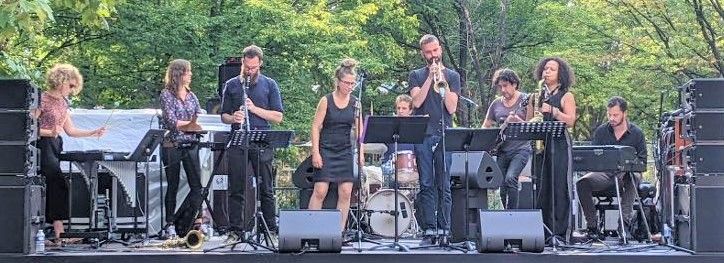
''It’s been ten years,'' writes Stéphanie Knibbe, ''since I left the UK this year. The surprise couldn’t be greater when Stephen Graham, who I met when I was working at the Vortex (as well as with the F-ire and the Loop collectives), offered me the chance to contribute as a guest. Back then, I had been asked to speak about the London jazz scene; today is time to speak about the Paris jazz scene''
''It feels like it was yesterday that I started working with the Onze Heures Onze collective. However, I’ve been working towards developing their many projects for six years already. Today, this collective, founded by Alexandre Herer, Julien Pontvianne and Olivier Laisney 11 years ago, not only promotes their personal projects through recordings, tours and festivals but is also very active in collaborating with other collectives. We strive to organise double-bills based on exchanges with other collectives. In September, the Constellations Festival, which was part of the 'Under the Radar' programming of the Jazz à la Villette Festival, gathered no less than seven collectives based in Paris (Loo, Real Time Music, Fondeurs de son, Déluge, Zoot, Pousse Production and Onze Heures Onze). But there are also other collectives or ensembles active on the Paris Jazz scene such as Coax or Mirr, the latter being largely involved in the Jazz sur Seine Festival this year in a newly opened venue in the north of Paris the 360 Music Factory.
''As for the Onze Heures Onze bands, they often have the opportunity to play in Paris in great venues such as Studio de l’Ermitage with which we have a long-standing relationship. 'Third places' appeared also: these are new hubs to create social interaction, emancipation and collective initiatives like La Gare in Paris 19 and Anis Gras in Arcueil.
''The Paris scene is still vibrant with a large variety of venues: from legendary venues on the rue des Lombards with Sunset/Sunside, Baiser Salé, Duc des Lombards to the 38 Riv’ or New Morning, without forgetting the Dynamo of the Banlieues Bleues Festival, improvised music nest Les Instants Chavirés or even Le Triton.
''My role within Onze Heures Onze is to develop our own projects both in France and internationally through our record label and tours organised with local partners in countries such as India, Japan or China.
''Nevertheless, it is important to us at Onze Heures Onze, to work in the interest of the many. That is why we are active members of an umbrella organisation that plays the role of a union to promote large ensembles. This organisation called Grands Formats (open to European ventures by the way), sits in on meetings at the Ministry to ensure that cultural diversity can be maintained, in particular by promoting the programming of ensembles of more than seven members.
''In France we also have a new Centre National pour la Musique that opened in January 2020. It is a fusion of various civil societies and funding bodies created to be a resource centre for all types of music, they devise funding schemes to sustain and to ensure that cultural diversity is preserved and that music is kept alive.''
Onze Heures Onze Orchestra at the Constellations festival on 4 September, above, and the Alexandre Herer Nunataq + Guests at Studio de l'Ermitage in September last year, top. Photos: Stéphanie Knibbe
More links and further reading:
Onze Heures Onze
Grands Formats
Paris Jazz Club
Constellations
